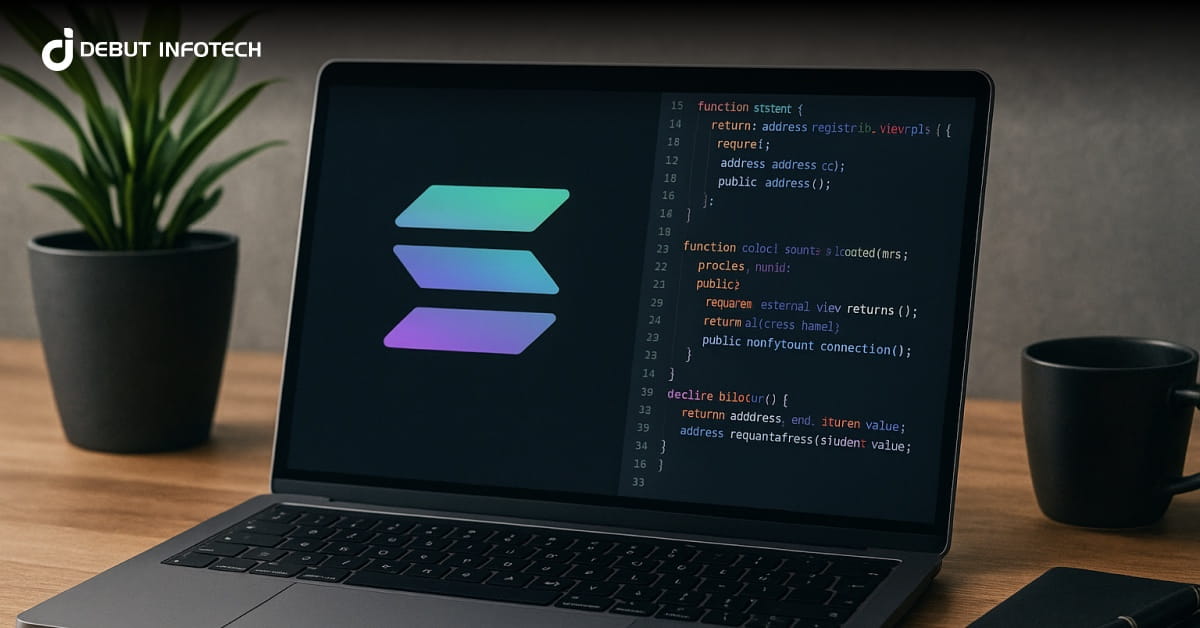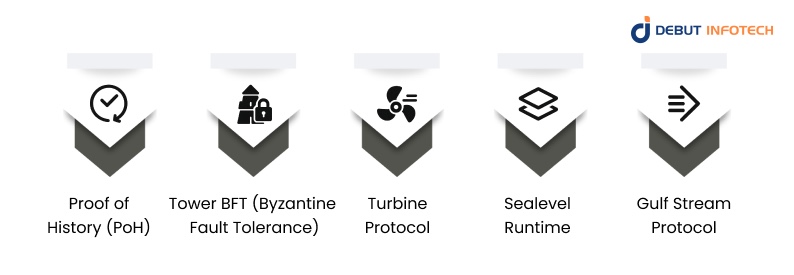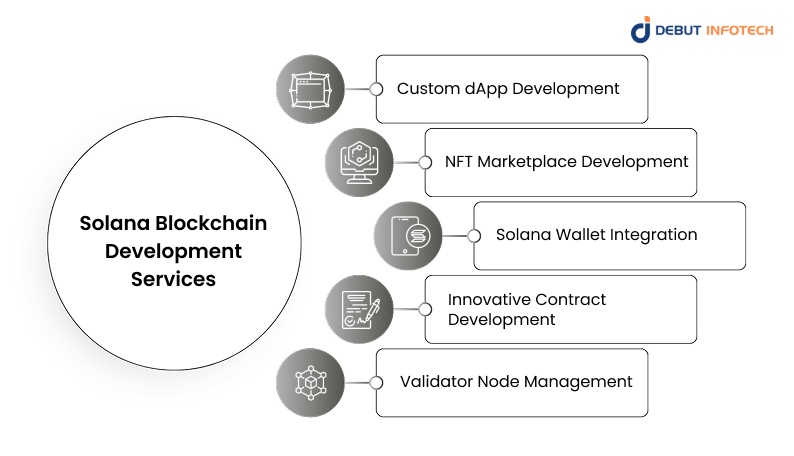Table of Contents
Home / Blog / Blockchain
Everything You Need to Know About Solana Blockchain Development
October 13, 2025

October 13, 2025
The blockchain technology is still transforming industries, and one platform that has been rapidly gaining momentum is Solana. Solana has been favored among both businesspeople and startups due to its high throughput, scalability, and ease of use as a developer platform. Businesses seeking to use the Solana blockchain development use it as an enticing option for building decentralized applications (dApps), decentralized finance (DeFi) projects, and enterprise-level blockchain solutions.
The growth of the popularity of Solana does not happen by chance–it is fast and affordable, and it is an interesting substitute to the other blockchains with expensive cryptocurrency exchange rates and slow confirmation times. As a Solana developer, an enterprise leader, or an entrepreneur planning to create a new project, it is essential to learn about the Solana blockchain platform, its architecture, issues, and opportunities to achieve success.
Build Your Solana Project with Confidence
Ready to bring your Solana blockchain idea to life? Our team of experts will help you design, develop, and deploy secure, scalable, and future-ready solutions.
Solana Blockchain Overview
Before diving into its features, it’s essential to look at the Solana blockchain overview. Solana is an open-source, decentralized blockchain that aims to serve as a foundation for high-performance applications. Solana is capable of processing transactions of up to 65,000 transactions per second (TPS) and boasts the world’s fastest consensus system due to its novel consensus system- Proof of History (PoH)-with Proof of Stake (PoS), unlike other chains that cannot handle congestion.
What is the date of the creation of the Solana block? The Solana blockchain was finally launched in March 2020, and since then, it has become one of the most reliable platforms for developers and businesses worldwide. The native token of the network, called Solana crypto (SOL), is used to conduct transactions, smart contracts, and incentives to act as a validator.
Companies that currently collaborate with a Solana blockchain development company can consider this scalability to implement real-life blockchain applications across various economic sectors, including finance, healthcare, logistics, and entertainment.
What is Solana Used For?
Solana is versatile and supports a wide variety of applications. Here’s what Solana is used for:
- DeFi Platforms: Lending, staking, and yield farming applications that demand high speed and low transaction fees.
- NFT Marketplaces: Solana’s scalability supports seamless minting and trading of NFTs.
- Web3 Gaming: Blockchain-based gaming with real-time asset ownership.
- Enterprise Workflows: Streamlined compliance, document verification, and supply chain management.
- Decentralized Exchanges (DEXs): High-frequency trading without costly delays.
A Solana developer can leverage Solana tools like Solana Rust, Anchor, and SDKs to build Solana blockchain app development projects tailored to unique industry needs.
Solana Blockchain Architecture
The true strength of Solana comes from its cutting-edge blockchain architecture, carefully designed to achieve high speed, scalability, and efficiency without compromising security. Unlike many older blockchains that face bottlenecks as they grow, Solana’s system relies on several innovative components that work together seamlessly.

Proof of History (PoH)
At the core of Solana’s architecture is Proof of History, a cryptographic clock that timestamps every event on the network. This innovation eliminates the need for validators to constantly communicate with each other to agree on transaction order. Instead, events are already time-stamped, creating a shared record that all participants can trust. The result is faster transaction processing and minimal delays in reaching consensus.
Tower BFT (Byzantine Fault Tolerance)
On top of PoH, Solana uses Tower BFT—its own optimized version of Byzantine Fault Tolerance. Tower BFT ensures that even if some nodes act maliciously, the network can still reach consensus quickly and securely. This combination of speed and resilience makes Solana particularly attractive for enterprise blockchain development, where reliability is critical.
Turbine Protocol
One of the challenges of scaling a blockchain is distributing large amounts of data to thousands of nodes. Solana solves this with the Turbine protocol, which breaks blocks into smaller packets and distributes them efficiently across the network. This method reduces bandwidth requirements and ensures that information reaches validators quickly, enabling faster block propagation.
Sealevel Runtime
Smart contract execution is another area where Solana stands out. Traditional blockchains often struggle with parallel execution, but Solana’s Sealevel runtime allows thousands of smart contracts to run simultaneously without interfering with one another. This parallel processing capability is crucial for high-performance decentralized applications (dApps), such as DeFi platforms and large-scale enterprise solutions.
Gulf Stream Protocol
Finally, Solana’s Gulf Stream protocol takes a unique approach to transaction management. Instead of relying on a traditional mempool, Gulf Stream forwards transactions directly to validators even before the previous block is finalized. This reduces confirmation time, enables faster leader switching, and lowers the memory load on validators.
Together, these components make Solana one of the most efficient blockchains currently available. For businesses exploring enterprise blockchain solutions, Solana’s architecture provides reduced latency, increased throughput, and the ability to handle complex workloads at scale. This combination of features explains why Solana has become a popular choice for developers and enterprises alike.
Related Read: Solana Introduces Feature Enabling Crypto Transactions.
Solana Blockchain Features
What makes Solana stand out in the crowded blockchain space is not just its speed, but the combination of features that make it a practical choice for developers, enterprises, and end users. These features directly address the most significant limitations found in older blockchains, such as Bitcoin and Ethereum, creating an environment where both scalability and affordability coexist.
Scalability
Solana’s ability to process tens of thousands of transactions per second (TPS) is one of its most defining strengths. Unlike blockchains that slow down under heavy demand, Solana’s architecture ensures consistent high performance. This makes it well-suited for enterprise blockchain applications that require handling massive volumes of data or processing financial transactions in real-time.
Low Fees
Transaction costs on Solana are a fraction of what you’ll find on Ethereum or Bitcoin. While network congestion often drives fees higher on competing platforms, Solana maintains stable, minimal costs—typically less than a cent per transaction. This low-fee structure removes a significant barrier for businesses and startups looking to build cost-effective blockchain solutions.
Energy Efficiency
Sustainability is a growing concern in blockchain development, and Solana’s hybrid Proof-of-Stake (PoS) and Proof-of-History (PoH) model addresses it directly. By avoiding energy-intensive mining, Solana drastically reduces power consumption compared to proof-of-work blockchains. For businesses conscious of their carbon footprint, Solana is a greener, future-ready choice.
Security
Security is non-negotiable in any blockchain ecosystem. Solana employs its Tower BFT consensus mechanism and robust cryptographic techniques to secure the network against attacks and ensure the integrity of transactions. This level of protection provides peace of mind for enterprises building mission-critical applications, where trust and reliability are essential.
Cross-Compatibility
Integration plays a significant role in Solana’s adoption. The blockchain works seamlessly with Solana-native wallets, decentralized exchanges, and a wide range of third-party tools. This cross-compatibility ensures that developers can easily connect Solana projects with broader ecosystems, expanding their reach and functionality.
Ecosystem Growth
Beyond its technical capabilities, Solana boasts one of the fastest-growing ecosystems in the blockchain space. From decentralized finance (DeFi) platforms and NFT marketplaces to gaming and financial services, the Solana ecosystem continues to expand. This growth means more opportunities for businesses to collaborate, innovate, and access a ready-made audience of users and investors.
Taken together, these features position Solana as more than just another blockchain—it’s a practical platform for real-world use cases. For businesses seeking scalability, affordability, and security, working with a Solana project development company can unlock solutions that are efficient, sustainable, and future-proof.
Blockchain Use Cases on Solana
The Solana blockchain platform supports a diverse range of blockchain use cases:
- Finance: High-frequency DeFi protocols, lending, staking, and decentralized exchanges.
- Healthcare: Secure sharing of patient data and insurance claim management.
- Supply Chain: Transparent product tracking across global networks.
- Entertainment: NFTs for music, video, and gaming industries.
- Real Estate: Tokenization of properties and automated contract settlements.
These examples show why enterprise blockchain development on Solana is a growing trend for forward-looking businesses.
Solana Tools and Development Environment
Developers working on Solana projects have access to a robust set of tools that simplify building and scaling applications:
- Solana CLI: A command-line interface that helps developers deploy nodes, manage configurations, and interact directly with the Solana blockchain.
- Solana Rust: The primary programming language for writing smart contracts (known as programs) on Solana, chosen for its safety and performance.
- Anchor Framework: A developer-friendly framework that streamlines the process of creating, testing, and deploying Solana smart contracts.
- SDKs and APIs: Available in multiple languages like JavaScript and Python, these make it easier to integrate Solana into existing applications.
- Solana Wallets: Popular wallets, including Phantom, Solflare, and Ledger, enable users to store tokens and interact seamlessly with decentralized applications (dApps).
By leveraging these tools—and the expertise of top Solana blockchain development companies—organizations can reduce complexity and speed up blockchain app development.
Solana Blockchain Development Services
A wide range of Solana blockchain development services is available today. These include:

- Custom dApp Development: Developers create decentralized applications tailored to industry needs, such as DeFi protocols, healthcare record systems, supply chain tracking, or logistics optimization. Solana’s speed and scalability ensure these dApps handle large user bases with minimal delays.
- NFT Marketplace Development: With the rise of NFTs, Solana offers an affordable alternative to Ethereum by keeping cryptocurrency exchange fees low. Development companies build marketplaces that allow minting, trading, and auctioning of NFTs while integrating features like royalties, multi-wallet support, and cross-chain compatibility.
- Solana Wallet Integration: Wallets are at the core of blockchain interactions. Solana development services encompass building new wallets or integrating popular ones, such as Phantom, Solflare, and Ledger, into platforms, ensuring users have secure and seamless access to their digital assets.
- Innovative Contract Development: Leveraging Solana Rust and the Anchor framework, developers design secure and high-performance smart contracts. These contracts automate transactions, enforce trustless agreements, and power applications in DeFi, gaming, and enterprise systems.
- Validator Node Management: For businesses interested in participating directly in Solana’s consensus mechanism, development services include setting up validator nodes. Many providers also offer revenue-sharing models, enabling enterprises to generate passive income while supporting the network’s decentralization.
Companies can benefit by hiring a Solana blockchain development company that offers end-to-end services, from ideation to deployment and post-launch support.
Solana Blockchain Development Challenges
Like any emerging technology, there are Solana blockchain development challenges that businesses and developers must navigate:
- Network Outages: Solana has faced downtime in the past due to congestion.
- Complex Development: Solana Rust and Anchor require specialized skills.
- Centralization Concerns: High hardware requirements can limit the diversity of validators, potentially compromising the security of the network.
- Regulatory Hurdles: Enterprises must ensure compliance with financial market and security regulations.
- Scalability Testing: While Solana offers high throughput, sustaining performance under extreme load remains an area of concern.
Engaging a blockchain development company with expertise in Solana can help businesses effectively overcome these challenges.
Read More – Smart Contract Development Companies: What You Need to Know in 2025
Blockchain Development Cost for Solana Projects
One of the most pressing questions for businesses is the blockchain development cost of launching a project on Solana. Costs depend on several factors:
- Development Model: White label crypto exchange solutions are cheaper than custom builds.
- Complexity of Features: dApps with advanced functionalities cost more.
- Integration Needs: Adding Solana wallets, custodial services, or external APIs increases cost.
- Team Expertise: Partnering with crypto exchange development companies or specialized Solana developers affects pricing.
- Ongoing Maintenance: Post-deployment support adds to long-term costs.
While the price varies, enterprises often consider Solana to be cost-effective due to its low transaction fees and high efficiency. Validators are at the heart of Solana’s ecosystem. Through Solana validator management services revenue sharing models, businesses can:
- Set up validator nodes to earn rewards in Solana crypto.
- Share revenue with delegators who stake their tokens.
- Enhance network security by participating in validation.
For enterprises, this provides both revenue opportunities and credibility within the Solana blockchain platform.
Leading Solana Blockchain Development Partners
For businesses planning to launch projects on Solana, partnering with experienced blockchain development companies is often the most effective path. These firms bring not only technical expertise but also practical insights into building scalable and secure blockchain ecosystems. Their services typically include:
- Specialized Knowledge in Solana Development: From understanding Solana blockchain architecture to implementing custom features, these companies ensure projects are designed for speed, efficiency, and security.
- Expert Solana Developers: Skilled professionals proficient in Rust, Anchor, and Solana’s development tools deliver high-quality smart contracts, decentralized apps (dApps), and integration solutions.
- Proven Project Experience: Many leading firms have successfully launched NFT marketplaces, DeFi platforms, and enterprise-grade blockchain applications that highlight Solana’s strengths.
- Strategic Consulting and Support: Beyond coding, these companies guide clients through compliance, deployment, validator management, and scaling challenges.
Among the top Solana blockchain development companies, Debut Infotech stands out as a trusted Solana project development company. With deep expertise in blockchain software development, Debut Infotech provides tailored solutions that combine innovation with industry best practices.
Future of Solana Development
The future of Solana development looks promising. With constant upgrades to the Solana blockchain architecture, better validator support, and an expanding ecosystem of dApps, Solana is positioning itself as a leader in blockchain scalability.
For enterprises, this means greater opportunities in Solana blockchain software development, whether through launching decentralized finance (DeFi) solutions, tokenizing assets, or creating enterprise-grade applications. As blockchain consultants emphasize, Solana’s trajectory points to stronger adoption across financial markets, healthcare, gaming, and more.
Partner with Solana Development Experts
From dApps to NFT marketplaces, Debut Infotech delivers end-to-end Solana blockchain development services tailored to your business needs. Let’s turn your vision into reality.
Conclusion
Solana has emerged as a game-changer in the blockchain space, offering unmatched scalability, low transaction fees, and a rapidly expanding ecosystem. Businesses exploring Solana blockchain development gain access to a robust platform for building next-generation decentralized apps, NFT marketplaces, and enterprise-grade solutions. With innovative features, strong architecture, and wide blockchain use cases, Solana continues to transform industries that require speed and efficiency.
For companies, the choice of a reliable Solana blockchain development company plays a crucial role in overcoming development challenges and unlocking the platform’s full potential. Debut Infotech stands out as a trusted partner, offering comprehensive Solana blockchain development services tailored to unique business needs. As the future of Web3 and blockchain unfolds, Solana will remain at the center of innovation—making now the best time for enterprises to leverage its capabilities.
Frequently Asked Questions
A. Solana is widely applied in building decentralized applications (dApps), NFT marketplaces, and DeFi platforms. Thanks to its high speed and low transaction costs, it’s also gaining popularity in Web3 and enterprise blockchain development.
A. The answer lies in its unique Proof of History (PoH) mechanism combined with Proof of Stake (PoS). This hybrid approach enables Solana to process thousands of transactions per second, reducing congestion and keeping cryptocurrency exchange fees low.
A. Solana primarily relies on Rust, though C and C++ are also supported. Rust has become the most popular choice because it delivers high performance and strong memory safety.
A. Some of the biggest hurdles include understanding its complex architecture, ensuring stability during peak usage, and adapting to frequent updates to the ecosystem. Many companies address these issues by working with an experienced Solana blockchain development company.
A. The blockchain development cost varies depending on the type of project—whether it’s a simple dApp, an NFT marketplace, or a large-scale enterprise solution. Complexity of smart contracts, integrations with Solana wallets, and design requirements all play a role in determining pricing.
A. Yes. Solana’s scalability, throughput, and affordability make it a strong fit for industries like finance, gaming, healthcare, and supply chain management.
A. Beginners can start by exploring Solana tools like the CLI, SDKs, and Anchor framework. For businesses without technical teams, hiring a Solana project development company ensures end-to-end support from design to deployment.
Our Latest Insights



Leave a Comment